
Pinckney Benton Stewart Pinchback was an American publisher, politician, and Union Army officer. Pinchback was the first African American governor of a U.S. state and the second lieutenant governor. A Republican, Pinchback served as acting governor of Louisiana for 35 days from December 9, 1872 to January 13, 1873, during which ten acts of Legislature became law. He was one of the most prominent African-American officeholders during the Reconstruction Era.
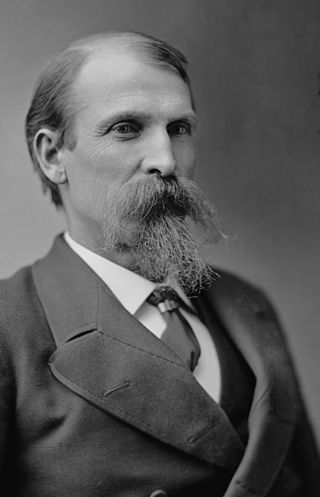
Powell Foulk Clayton was an American politician, diplomat, and businessman who served as the 9th governor of Arkansas from 1868 to 1871, as a Republican United States Senator for Arkansas from 1871 to 1877 and as United States Ambassador to Mexico from 1897 to 1905.

Thomas James Churchill was an American soldier and politician who served as the 13th governor of Arkansas from 1881 to 1883. Before that, he was a senior officer of the Confederate States Army who commanded infantry in the Western and Trans-Mississippi theaters of the American Civil War.

The Brooks–Baxter War, also known as the Brooks–Baxter Affair, was an attempt made by failed gubernatorial candidate Joseph Brooks of the “Brindle-tail” faction of Arkansas' Republican Party to take control of the state from Elisha Baxter, who was the Republican governor. The victor in the end was the Baxter administration, also known as the "Minstrels", supported by "carpetbaggers" over the Brindle-tails supported by "scalawags" and "freedmen".
The Radical Republicans were a faction within the Republican Party originating from the party's founding in 1854—some six years before the Civil War—until the Compromise of 1877, which effectively ended Reconstruction. They called themselves "Radicals" because of their goal of immediate, complete, and permanent eradication of slavery in the United States. They were opposed during the war by the Moderate Republicans, and by the Democratic Party. Radicals led efforts after the war to establish civil rights for former slaves and fully implement emancipation. After unsuccessful measures in 1866 resulted in violence against former slaves in the rebel states, Radicals pushed the Fourteenth Amendment for statutory protections through Congress. They opposed allowing ex-Confederate officers to retake political power in the Southern U.S., and emphasized equality, civil rights and voting rights for the "freedmen", i.e., former slaves who had been freed during or after the Civil War by the Emancipation Proclamation and the Thirteenth Amendment.

Lorenzo Thomas was an American officer in the United States Army who was Adjutant General of the Army at the beginning of the American Civil War. After the war, he was appointed temporary Secretary of War by U.S. President Andrew Johnson, precipitating Johnson's impeachment.
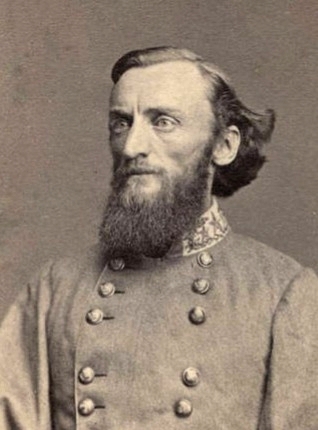
John Sappington Marmaduke was an American politician and soldier. He was the 25th governor of Missouri from 1885 until his death in 1887. During the American Civil War, he was a senior officer of the Confederate States Army who commanded cavalry in the Trans-Mississippi Theater.

Robert Cumming Schenck was a Union Army general in the American Civil War, and American diplomatic representative to Brazil and the United Kingdom. He was at both battles of Bull Run and took part in Jackson's Valley Campaign of 1862, and the Battle of Cross Keys. He served two separate multi-term stints in the U.S. House of Representatives.

James Mitchell Ashley was an American politician and abolitionist. A member of the Republican Party, Ashley served as a member of the United States House of Representatives from Ohio during the American Civil War, where he became a leader of the Radical Republicans and pushed for passage of the Thirteenth Amendment, ending slavery in the United States. He also authored the resolution which started the first impeachment inquiry against Andrew Johnson. After the war, he served as Governor of the Montana Territory and president of the Ann Arbor Railroad.

Thomas Mead Bowen was a state legislator in Iowa and Colorado, a Union Army officer during the American Civil War, a justice of the Arkansas Supreme Court, briefly the Governor of Idaho Territory, an elected judge in Colorado and a United States senator from Colorado.
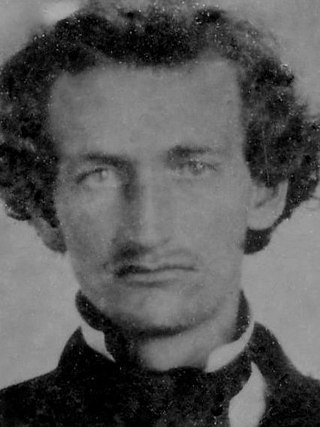
James M. Hinds was the first U.S. Congressman assassinated in office. He served as member of the United States House of Representatives for Arkansas from June 24, 1868 until his assassination by the Ku Klux Klan. Hinds, who was white, was an advocate of civil rights for black former slaves during the Reconstruction era following the American Civil War.
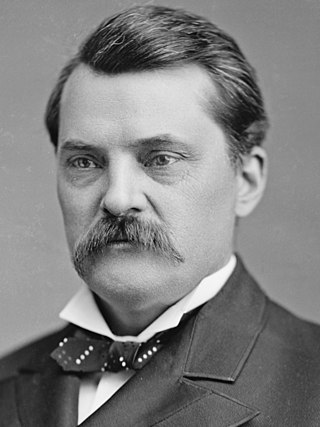
Anson George McCook was an American military and political figure who served as Union Army colonel during the Civil War. In recognition of his service, in 1866, he was nominated and confirmed for appointment to the grade of brevet brigadier general of volunteers. In civilian life, he was an attorney and three-term reconstruction era U.S. Congressman from New York. He was a member of the “Fighting McCooks,” one of America's most prolific military families during the Civil War.

John Bullock Clark Jr. was a general in the Confederate States Army during the American Civil War and a Reconstruction era five-term U.S. Congressman from Missouri.

Henry Clay Warmoth was an American attorney and veteran Civil War officer in the Union Army who was elected governor and state representative of Louisiana. A Republican, he was 26 years old when elected as 23rd Governor of Louisiana, one of the youngest governors elected in United States history. He served during the early Reconstruction Era, from 1868 to 1872.

The impeachment of Andrew Johnson was initiated on February 24, 1868, when the United States House of Representatives passed a resolution to impeach Andrew Johnson, the 17th president of the United States, for "high crimes and misdemeanors". The alleged high crimes and misdemeanors were afterwards specified in eleven articles of impeachment adopted by the House on March 2 and 3, 1868. The primary charge against Johnson was that he had violated the Tenure of Office Act. Specifically, that he had acted to remove from office Edwin Stanton and to replace him with Brevet Major General Lorenzo Thomas as secretary of war ad interim. The Tenure of Office Act had been passed by Congress in March 1867 over Johnson's veto with the primary intent of protecting Stanton from being fired without the Senate's consent. Stanton often sided with the Radical Republican faction and did not have a good relationship with Johnson.
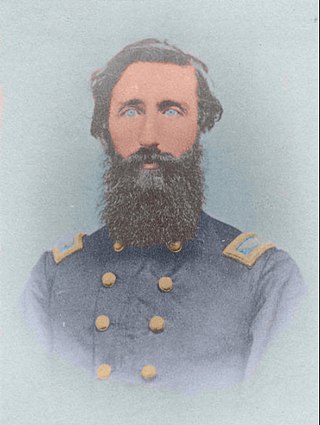
James M. Johnson was an American soldier and Arkansas politician. During the American Civil War he was a southern unionist and officer in the Union Army; serving as an aide to multiple generals and later commanded the 1st Arkansas Infantry Regiment (Union), eventually being made a brevet brigadier general. Following the war he would become the 2nd Lieutenant-Governor of Arkansas and later the 10th Secretary of State of Arkansas. During his tenure in Arkansas politics Johnson formed his own faction in the Arkansas Republican Party, which went against the policies of Governor Powell Clayton. The two men later tried to impeach the other on trumped up charges. Though Johnson was never convicted he lost his political support and left politics.
The Kirk–Holden war was a police operation taken against the white supremacist organization Ku Klux Klan by the government in the state of North Carolina in the United States in 1870. The Klan was using murder and intimidation to prevent recently freed slaves and members of the Republican Party from exercising their right to vote in the aftermath of the American Civil War. Following an increase in Klan activity in North Carolina—including the murder of a black town commissioner in Alamance County and the murder of a Republican state senator in Caswell County—Republican Governor of North Carolina William W. Holden declared both areas to be in a state of insurrection. In accordance with the Shoffner Act, Holden ordered a militia be raised to restore order in the counties and arrest Klansmen suspected of violence. This resulted in the creation of the 1st and 2nd North Carolina Troops, which Holden placed under the overall command of Colonel George Washington Kirk.

Daniel Harris Reynolds was a Confederate States Army brigadier general during the American Civil War. He was born at Centerburg, Ohio, but moved to Iowa, Tennessee, and finally to Arkansas before the Civil War. He was a lawyer in Arkansas before the war. After the war, Reynolds resumed his practice of law and was a member of the Arkansas Senate for one term.

Levin Major Lewis was a Confederate States Army colonel during the American Civil War. On May 16, 1865, he was assigned to duty as a brigadier general by General E. Kirby Smith when the war in the Trans-Mississippi Department was almost over, but he was not officially appointed by Confederate President Jefferson Davis and confirmed by the Confederate Senate to that grade.
The Military Division of the James was an administrative division or formation of the United States Army which existed for ten weeks at the end of the American Civil War. This military division controlled military operations between April 19, 1865 and June 27, 1865 in parts of Virginia and North Carolina under control of two main Union armies, the Army of the Potomac and the Army of the James.
















